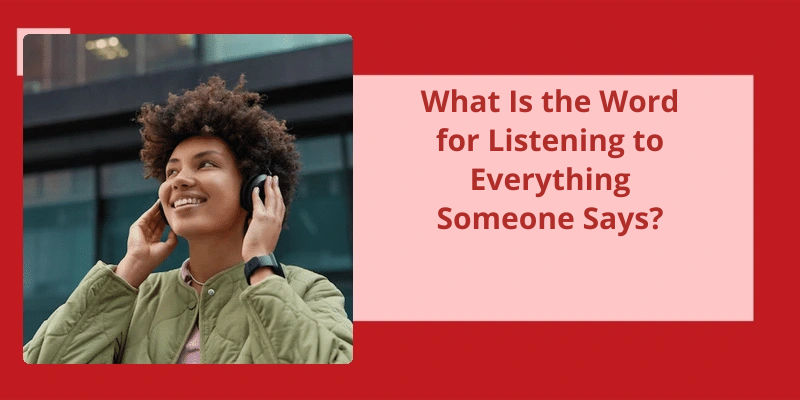In today's world, where communication is key to almost everything we do, it’s important to have a clear understanding of the different ways we can listen to people. One such way is "eavesdropping", which involves secretly listening in on someone's conversation without their knowledge or consent. While this may often be viewed as unethical or invasive, there are certain situations where it can be beneficial, such as in the case of law enforcement or espionage. It’s important to note, however, that eavesdropping is generally not condoned and can carry legal consequences. With all this in mind, it’s crucial that we strive to listen to others in a respectful and ethical manner, regardless of the circumstances.
What Is a Fancier Word for Listening?
Listening is a fundamental part of communication and plays a significant role in building relationships between people. Although listening seems like a simple skill to master, it’s quite complex and requires attention, focus, and patience. The act of listening involves actively engaging with what’s being communicated and trying to comprehend the message being conveyed. It’s imperative for effective communication that both parties feel heard and understood, and active listening plays a vital role in ensuring that this happens.
Another word for listening can be accepting. When a person is listening, they’re accepting the sounds and words being transmitted and opening themselves up to the possibility of understanding. Attending is another synonym for listening. It highlights the fact that listening requires focus and attention. Concentrating is also a word that can be used to describe active listening. It refers to being fully present in the moment and entirely focused on the sounds and words being communicated.
Hearkening is another word for listening that’s less commonly used but still holds the same value. It refers to paying attention to the sounds and signals around you and using them to influence your actions and thoughts. Another synonymous word for listening is heeding. This word refers to taking guidance from what you hear and using it to inform your decisions and actions. Whether it’s in a personal or professional setting, heeding what others say is essential in ensuring successful outcomes.
Lastly, interested is a word that can be used to describe active listening. When a person is listening, they’re showing interest in the speakers thoughts and ideas. They’re paying attention and taking what’s said seriously, which can lead to a deeper understanding of the person and their thoughts. Interested listening can help build stronger relationships as it demonstrates caring and empathy.
In summary, active listening is an essential part of effective communication and can be described through various words, including attending, concentrating, hearkening, heeding, and interested. By using these synonyms, we can appreciate the complexity of listening and recognize it’s importance in building successful relationships and achieving successful outcomes.
Tips for Improving Active Listening Skills
- Focus on the speaker and their message.
- Avoid multitasking or being distracted.
- Show interest through nonverbal cues like nodding or eye contact.
- Ask clarifying questions to ensure understanding.
- Paraphrase what the speaker has said to confirm comprehension.
- Avoid interrupting or changing the subject.
- Reflect on what’s been said before responding.
- Acknowledge the speaker’s feelings and perspectives.
- Avoid making assumptions or jumping to conclusions.
- Practice empathy and understanding towards the speaker.
Effective communication requires more than just talking; it also involves active and reflective listening. Reflective listening, which is also known as mindful, conscious, or deep listening, involves actively focusing on what the speaker is saying and then repeating or paraphrasing their words back to them. On the other hand, active listening refers to being attentive and deliberately listening to the speaker to understand their point of view better. While both types of listening share similarities, they differ in their specific approaches and techniques.
What Is Another Word for Reflective Listening?
Active listening, also referred to as empathic listening or reflective listening, is the practice of fully concentrating on the speaker, understanding their message, and responding in a way that shows empathy and comprehension. It’s often used in counseling, therapy, and other contexts where effective communication is important. This type of listening requires patience and a willingness to put oneself in anothers shoes.
On the other hand, reflective listening is a term often used interchangeably with active listening. It’s often used in counseling sessions to help the client feel heard and acknowledged, and to clarify any misunderstandings.
Mindful listening is another way of describing active or reflective listening. This term emphasizes the importance of being present and fully engaged in the conversation, rather than letting the mind wander or becoming distracted. It requires a heightened level of awareness and attention, and is often used in mindfulness practice as a way of cultivating greater awareness and connection.
Conscious listening is similar to mindful listening, but focuses on bringing conscious attention to the act of listening itself. This involves actively engaging with the speaker and their message, without being distracted by other thoughts or stimuli. It requires a deliberate effort to stay focused and engaged, and can be especially helpful in situations where effective communication is critical.
Deep listening is a term often used in spiritual and philosophical contexts, and refers to the act of listening with an open, receptive, and non-judgmental attitude. This type of listening involves setting aside ones own preconceptions and biases, and allowing oneself to be fully present with the speaker and their message. It requires a deep level of empathy and understanding, and can be transformative for both the listener and the speaker.
Finally, deliberate listening emphasizes the intentional and purposeful nature of active and reflective listening. This may involve asking clarifying questions, summarizing key points, or expressing empathy and understanding.
In social situations, people tend to engage in conversations with one another. While some are active participants, others prefer to remain quiet and listen. These people are commonly referred to as listeners and are often praised for their attentiveness and ability to absorb information. However, listening in on someone else’s conversation without their consent is considered intrusive and inappropriate behavior. In this article, we will delve deeper into the different types of listeners and the etiquette surrounding listening in on private conversations.
What Do You Call a Person Who Listens to the Conversation of Others?
A listener is someone who’s the ability to pay attention and absorb information from spoken words around them. They’re often admired for their keen listening skills and being able to engage in conversations that are both meaningful and enriching. Although some people might view listeners as individuals who lack the ability to speak up or voice their opinions, listeners play a valuable role in society. Through the act of listening, they can gain profound insights about the world and the many people who inhabit it.
There are different types of listeners. Some listeners are active, where they engage in discussions and actively participate in the conversation, while others prefer to be passive listeners, where they quietly observe the conversation around them. Regardless of their preferred listening style, listeners possess an innate ability to retain and process valuable information and knowledge. Their listening skills can be a valuable asset in various professions, such as counseling, journalism, customer service, and many others.
Listeners can be incredibly perceptive, and their attentive nature can help others feel heard and valued. In social settings, they can be great conversationalists because they’re willing to genuinely pay attention to the words that people are saying. Likewise, their skills as empathetic listeners can help support individuals who’re experiencing distress or needing a sounding board to share their thoughts and ideas.
Despite the positive attributes of a listener, there are instances where the act of listening can be viewed as negative. If someone listens in to private conversations without permission, they could be seen as nosy or intrusive. Furthermore, when listening turns into eavesdropping, it violates the boundaries of privacy and respect for others. Therefore, it’s essential to practice good listening habits that respect others privacy and dignity.
The Different Types of Listening (i.e. Empathetic Listening, Critical Listening, Appreciative Listening, Etc.)
- Empathetic listening
- Critical listening
- Appreciative listening
- Discriminative listening
- Comprehensive listening
- Active listening
- Passive listening
Source: What do you call a person who always listens to you when …
It’s easy to mistake listening as a passive activity, but actively engaging in the act of listening can make a significant difference in communication. Active listening involves preparing to listen, observing verbal and non-verbal messages, and providing appropriate feedback that shows attentiveness to the message being presented. In this article, we’ll explore the importance of active listening and how to cultivate this skill in various settings.
What Is the Term Used for Listening Attentively and Carefully?
Active listening is a term used to describe a type of listening where the listener is fully engaged and present in the conversation. This means that the listener isn’t only hearing the words being spoken, but is also paying attention to non-verbal cues such as body language and tone of voice.
Effective communication is often dependent on active listening. When we listen actively, we’re able to pick up on subtle nuances in the conversation that might otherwise be missed. We’re able to ask insightful questions and provide thoughtful feedback, which can help us build stronger relationships with others.
Active listening isn’t something that comes naturally to everyone. It requires practice and intentional effort to develop this skill. Some tips for becoming a more active listener include focusing on the speaker, avoiding distractions, asking open-ended questions, and providing feedback in a non-judgmental manner.
In todays fast-paced world, it can be all too easy to fall into the trap of passive listening. We might be physically present in a conversation, but our minds are elsewhere. This can lead to misunderstandings, missed opportunities, and damaged relationships. By making a conscious effort to practice active listening, we can become more effective communicators and build stronger connections with others.
By paying attention to both verbal and non-verbal cues, using reflective techniques, and providing feedback in a non-judgmental manner, we can demonstrate our attentiveness and build stronger relationships with others. While it may take time and effort to develop this skill, the benefits are well worth it. So the next time you find yourself in a conversation with someone, take a moment to focus on active listening and see how it can transform the way you communicate.
One form of active listening that goes beyond just hearing words is empathic listening. This involves not only understanding what someone is saying, but also empathizing with their emotions and perspective. It’s a powerful tool for building relationships and helping people feel heard and understood.
What Is the Word for Listening to Someone’s Problems?
Empathic listening, on the other hand, is a particular type of listening that goes beyond hearing just the words being spoken. This type of listening involves active engagement with the speaker, asking questions, and reflecting back on what’s been said to gain a deeper understanding.
Understanding involves putting oneself in the speakers shoes and seeing the situation from their perspective. Attuning involves being fully present and attentive to what the speaker is saying, as well as the nonverbal cues they’re giving. Responding involves responding to what the speaker is saying in a way that acknowledges and validates their feelings, thoughts, and perspective.
It can help create a supportive and positive environment in which people feel heard, understood, and valued. When people feel listened to and understood, they’re more likely to open up, communicate more effectively, and feel a greater sense of trust and connection. This can lead to increased productivity, creativity, and overall well-being.
It’s an essential skill in many fields and can help build strong relationships, trust, and a positive environment.
Listening is an essential part of effective communication. However, not all listening is the same. Sometimes, we need to go beyond just hearing the words being spoken and truly tune in to the person and the message they’re trying to convey. This is where the concept of deep or mindful listening comes in. With deep listening, we strive to be fully present, conscious, and deliberate in our attention, in order to truly understand the speaker and their message. As the quote states, deep listening allows us to tap into the inner being of others.
What Is a Word for Deep Listening?
Deep listening refers to the practice of paying attention to the speakers words and body language. It’s a powerful form of communication that can help build stronger relationships and promote empathy and understanding. The key to deep listening is to be mindful and present in the moment, without judgment or distraction. This means actively focusing on what the speaker is saying, rather than simply waiting for your turn to speak.
Conscious listening is another way of describing this attentive approach to communication. It means being fully aware of the speakers words, emotions, and intentions, and responding in a thoughtful and compassionate way. This type of listening requires patience, curiosity, and an open mind. When we engage in conscious listening, we create a safe and supportive space for the speaker to share their thoughts and feelings.
Deliberate listening is a similar concept, but with a slightly different emphasis. It involves making a conscious effort to listen carefully and with intention, rather than simply relying on instinct or habit. Deliberate listening requires discipline and focus, and is often used in contexts where accuracy and comprehension are critical, such as in scientific research or legal proceedings.
Being attentive is a more general term that can refer to any form of focused awareness. It can be applied to many different situations, from listening to a friend in need to paying close attention during a lecture or presentation. When we’re attentive, we’re fully present in the moment and engaged with our surroundings. This can help us build stronger connections with others, as well as enhance our personal growth and development.
The Benefits of Deep Listening for Personal and Professional Relationships
- Develops empathy and understanding
- Encourages trust and openness
- Improves communication skills
- Reduces conflict and misunderstandings
- Fosters collaboration and teamwork
- Increases emotional intelligence
- Enhances personal growth and development
- Leads to better decision making
- Creates stronger personal and professional relationships
Conclusion
In conclusion, eavesdropping is a word that describes the act of listening in on someone's conversation without their knowledge or consent. It’s often seen as an invasion of privacy and can be unethical in certain situations. However, it can also be a valuable skill when used appropriately, such as for investigative purposes or in situations where safety is a concern.






